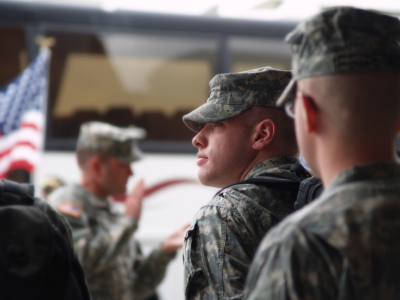Military Defense
What is Insubordination in the Military?

If you have been accused of insubordination as a member of the military, the repercussions can entirely derail your career and plans for the future. Every branch of the military follows a chain of command in order to maintain accountability, efficiency, and organization.
When a service member disobeys the chain of command in some manner, he or she may face severe consequences.
Examples of Insubordination
Under the Uniform Code of Military Justice (UCMJ), insubordinate actions can include the following:
Assaulting a Superior Officer – It is prohibited for any service member to threaten violence or physically strike a superior officer, such as yelling, gesturing, brandishing a weapon, or intentional touching.
Coast Guardsman Sentenced to Eight Years of Confinement in Sexual Assault Case

A petty officer in the U.S. Coast Guard was recently convicted of five charges regarding sexual assault and other unlawful acts and sentenced to eight years of confinement, a reduction in pay grade, and a dishonorable discharge.
Between 2011 and 2012, the petty officer was the supervisor of a deck-maintenance crew of 30 people onboard the Coast Guard Cutter Gallatin, where he allegedly engaged in several acts of sexual misconduct with six female shipmates under his command and the rape of one civilian woman.
The petty officer was convicted of all the charges brought against him, including:
- Failure to obey a lawful order and regulation
- False official statement
- Cruelty and maltreatment
Navy Squadron Executive Officer Temporarily Demoted for DUI While on Duty

Drunk driving charges can greatly disrupt an individual’s life in any industry, but facing a DUI (driving under the influence) charge as a member of the military can result in devastating losses, both personally and professionally.
A Navy squadron executive officer was recently removed from his position by the Navy after he was allegedly caught driving under the influence of alcohol while in a vehicle on the Naval Air Station base in North Island, California. The officer’s squadron was undergoing training when the incident occurred.
What Happens When Appealing a Court Martial Conviction?

Unlike civil courts, when a member of the military faces a criminal conviction, he or she is not allowed to appeal the final verdict in the hope of reaching a new decision about the accused member’s guilt or innocence. Appealing a court martial conviction will only send the case to another judge or higher court within the military judicial system to re-evaluate the case for legal errors and to possibly determine a lesser sentence.
Some examples of the possible reasons for a courts martial appeal include:
- A mistake or wrongdoing that resulted in the dismissal of the jury.
- The military judge made an error or mistake.
- The final sentence is not appropriate for the crime.
- The accused is subjected to an unreasonable multiplication of charges.
- There was not enough evidence to warrant a conviction.
What is the Difference between AWOL and Desertion Charges?
While many people use the terms AWOL and desertion interchangeably, these charges are not entirely alike. Both are serious accusations in the U.S. military, and if you are being accused of AWOL or desertion, it is crucial that you talk to military defense Attorney Joseph H. Low IV to learn about your legal options. Facing courts martial for such charges is overwhelming and complex. You should not have to go it alone.
What Does AWOL Mean?
If a member of the military is not at his or her assigned post without a valid pass or leave, they may be considered AWOL or “Absent without Leave.” For example, showing up late to a scheduled post or missing an appointment can be considered a violation of the Uniform Code of Military Justice (UCMJ) because the military member was absent without authorization.
Fort Hood Gunman Conducts His Own Defense, Allegedly Seeking Death Penalty

The murder trial against the Army psychiatrist accused of firing on soldiers on a Military base in Fort Hood, Texas finally began recently. The presiding Army judge Col. Tara Osborn ruled that the accused gunman would be allowed to conduct his own defense, as long as his former lawyers would stand by if he needed help. The suspect faces 13 counts of premeditated murder and 32 counts of attempted premeditated murder.
After only two days the trial was halted yet again. The standby defense team that was ordered to assist the suspect argued that the suspect is using a “repugnant” defense strategy that forces them to violate their ethical obligations as a defense counsel. Lt. Col. Kris Poppe and the other standby lawyers requested to take over the case once more or have their roles minimized rather than contribute to a strategy they oppose.
Soldier Acquitted of Aiding the Enemy Charge in WikiLeaks Trial

The high-profile WikiLeaks case is nearing its conclusion after the Army Private accused of releasing thousands of classified documents to the popular whistle-blowing website was found guilty of 19 out of 21 charges. The Private faces a possible 136-year prison sentence for charges including espionage, theft, and computer fraud.
Ultimately, the presiding judge found the accused Private not guilty of aiding the enemy – a serious charge that drew a lot of attention to the trial in the first place. Prosecutors argued that the accused Private had indirectly disclosed classified information to the terrorist group Al-Qaeda, while the Private’s defense lawyer argued that aiding the enemy should only apply to those who directly conspire with America’s enemies.
Military Justice Improvement Act Gains Support in Congress
In response to the growing debate about the efficacy of the military justice system, Sen. Kirsten Gillibrand, D-N.Y. and bi-partisan supporters sponsored a new bill in Congress that would overhaul the existing chain of command in military trials. The effort is spurred on by a 34% increase in military sexual assault incidents in the past year, according to the Department of Justice.
The Military Justice Improvement Act proposes to move the decision-making authority from military commanders for cases of sexual assault and other serious crimes to military prosecutors instead. The bill would also prohibit the use of a military member’s service record as evidence to argue reasonable doubt, thereby preventing a case from going to trial.
Panel Suggests Combat Commanders Should Oversee War Zone Investigations

A Defense Department panel has recently proposed that military criminal proceedings be carried out by senior commanders, rather than the service branch of the accused member, especially in cases of combat crimes. The proposal was motivated by growing concerns that the military justice system is broken, citing a rising rate of acquittals and instances of prosecution errors in cases of military members accused of disobeying orders and killing or injuring civilians.
The panel highlighted a particular case that recently fell apart in which 8 Marines had been accused of killing 24 Iraqi civilians in Haditha in 2005. By the end of the trial in 2012, the charges had been dropped against six Marines, one Marine was acquitted in a court-martial, and the last agreed to a plea deal to avoid prison time. The outcome shocked American military law specialists who questioned whether a branch of service should be allowed to hold its own courts-martial for its own accused members for fear of misplaced loyalties.
What to Expect in a Military Domestic Violence Case
Domestic violence charges can have serious consequences, especially for members of the United States armed forces. According to an analyst at the Defense Department’s Family Advocacy Program (FAP), it is difficult to confirm the prevalence of family violence across the military because, often times, victims are reluctant to come forward for fear of ruining the spouse’s military career. Unlike civilian cases of domestic abuse, the military justice system can administer disciplinary actions, such as confinement, docked pay, loss of rank, and even dishonorable discharge.
If the alleged abuse happens on base, the investigation will be handled by the military police as well as the Family Advocacy Program. In many cases, the accused is prohibited from having contact with the alleged victim until the investigation is complete. The case is then decided by a multidisciplinary case review committee, consisting of members of the Family Advocacy Program, military law enforcement, a staff judge advocate, medical staff, and chaplain.